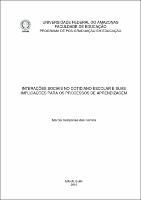| ???jsp.display-item.social.title??? |


|
Please use this identifier to cite or link to this item:
https://tede.ufam.edu.br/handle/tede/3206Full metadata record
| DC Field | Value | Language |
|---|---|---|
| dc.creator | Santos, Marcio Gonçalves dos | - |
| dc.creator.Lattes | http://lattes.cnpq.br/5268445515720062 | por |
| dc.contributor.advisor1 | Silva, Iolete Ribeiro da | - |
| dc.date.available | 2015-04-08 | - |
| dc.date.issued | 2010-01-12 | - |
| dc.identifier.citation | SANTOS, Marcio Gonçalves dos. Interações sociais no cotidiano escolar e suas implicações para os processos de aprendizagem. 2010. 101 f. Dissertação (Mestrado em Educação) - Universidade Federal do Amazonas, Manaus, 2010. | por |
| dc.identifier.uri | http://tede.ufam.edu.br/handle/tede/3206 | - |
| dc.description.resumo | Investigar as interações sociais no contexto escolar é a base para uma reflexão sobre os tipos de estruturas de aprendizagem utilizadas na educação e suas implicações para a construção do conhecimento. Esta pesquisa aborda especificamente as interações professor-aluno(s), aluno-aluno, mas centrando-se principalmente na estrutura cooperativa de aprendizagem como aquela que prevê mudanças em primeiro lugar, no plano social e em segundo lugar no psicológico. Estas mudanças não fomentam apenas nuances de autonomia, mas também uma melhor participação dos alunos, melhorando as relações sociais e o desempenho do aluno na escola. É uma pesquisa qualitativa e considera a perspectiva sociocultural construtivista como teoria base no processo de interpretação dos dados coletados a partir de quatro aulas de professores e uma situação estruturada, baseada em atividades cooperativas, em uma escola pública da cidade de Manaus. Para coleta dos dados, foi utilizado o diário de campo para registrar algumas observações e a videografia para a análise microgenética. Esse método foi escolhido por proporcionar uma melhor percepção dos detalhes dos processos de mudança. Como resultados, percebeu-se que a falta de planejamento das atividades oferecidas, em pares ou em grupos, pelos professores, não potencializava a estrutura de aprendizagem cooperativa, observando-se falha no processo educativo. Por outro lado, na situação estruturada, percebeu-se que a integração e a participação dos estudantes os ajudaram a construir conhecimentos mais adequados, mostrando o domínio de conceitos não-espontâneos, além de mais motivação para aprender. É importante ressaltar que isso só foi possível devido à organização das etapas das atividades com orientações sólidas para alcançar as metas exigidas no processo de aprendizagem. | por |
| dc.description.abstract | Investigating the social interactions on a school context is the basis for reflecting on the kinds of learning structures used on education and their implications to the knowledge construction. This research approaches specifically the teacher-student, student-student interactions, but focusing mainly the cooperative learning structure as the one that provides changes firstly in the social plan and secondly in the psychological one. These changes give not only pieces of autonomy but also better student participation, improving the social relations and the student s school productivity. It is a qualitative research and considers the constructivist sociocultural perspective as basis theory in the data interpretation process gathered from four teachers classes and the structuralized situation, based in cooperative activities, in a public high school of city of Manaus. For gathering the data, it was used the field diary to register some observations and the videography for the microgenetic analysis. The choice for this method was due to providing a better perception of details in the change processes. As results, it was perceived that the lack of planning of the activities offered by the teachers in pairs or in groups did not potentialize the cooperative learning structure, observing educative process failing. In the other hand, in the structuralized situation, the integration and participation of students helped them to construct knowledge more appropriated showing the use of non-spontaneous concepts besides more motivation to learn. It is important to mention that this only was possible because of the organization of steps of the activities with solid orientations to achieve the goals demanded by the learning process. | eng |
| dc.description.sponsorship | Fundação de Amparo à Pesquisa do Estado do Amazonas | - |
| dc.format | application/pdf | por |
| dc.thumbnail.url | http://200.129.163.131:8080//retrieve/7347/DISSERTACO-MARCIO%20SANTOS.pdf.jpg | * |
| dc.language | por | por |
| dc.publisher | Universidade Federal do Amazonas | por |
| dc.publisher.department | Faculdade de Educação | por |
| dc.publisher.country | BR | por |
| dc.publisher.initials | UFAM | por |
| dc.publisher.program | Programa de Pós-graduação em Educação | por |
| dc.rights | Acesso Aberto | por |
| dc.subject | Processo educativo | por |
| dc.subject | Interações sociais | por |
| dc.subject | Processo de aprendizagem | por |
| dc.subject | Estrutura de aprendizagem cooperativa | por |
| dc.subject | Educative Process | eng |
| dc.subject | Social Interactions | eng |
| dc.subject | Learning Process | eng |
| dc.subject | Cooperative Learning Structure | eng |
| dc.subject.cnpq | CIÊNCIAS HUMANAS: EDUCAÇÃO | por |
| dc.title | Interações sociais no cotidiano escolar e suas implicações para os processos de aprendizagem | por |
| dc.type | Dissertação | por |
| Appears in Collections: | Mestrado em Educação | |
Files in This Item:
| File | Description | Size | Format | |
|---|---|---|---|---|
| DISSERTACO-MARCIO SANTOS.pdf | 767.15 kB | Adobe PDF |  Download/Open Preview |
Items in DSpace are protected by copyright, with all rights reserved, unless otherwise indicated.




